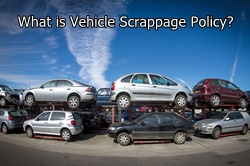
Table of Contents
Know About Vehicle Scrappage Policy
Nirmala Sitharaman, India’s Finance Minister, lately announced a voluntary vehicle scrappage policy. This one works toward phasing out unfit, old vehicles. Accordingly, this policy is an endeavour toward decreasing pollution as well as the fuel Import bills of India.

However, the policy holds a lot more than just these two factors. In this post, we have outlined the basics of vehicle scrappage policy and how it is going to be useful. Have a read ahead and understand more.
The Basic of Vehicle Scrappage Policy
Putting it in simple words, under this policy, the personal vehicles will have to undergo a fitness test after 20 years and commercial vehicles will have to undergo a fitness test after 15 years.
As per Mr Nitin Gadkari, the Union Road Transport Minister of India, there are almost 51 lakhs light vehicles that are more than 20 years old. And, there are almost 17 lakhs commercial vehicles with an age of 15 years or more.
Moreover, all of these vehicles are running without any valid fitness certificate. The minister believes that these vehicles are the major cause of pollution. But it is noted that out of these, only the ones that are old and don’t comply with the norms are deemed unfit to be on the road.
Also, if you buy a new vehicle after scrapping the old one, you’ll be eligible to acquire a variety of benefits and advantages. Saying that the policy could be a boon, Mr Gadkari stated that it is going to give a 30% boost to the Indian automobile Industry.
The Fitness Test in Scrappage Policy
As per the policy, such cars that are more than 15 years old, would have to undergo a test, known as a Certificate of Fitness Test (CF). This test will be executed at local RTOs and is regulated by officials.
The test needs vehicles to have mechanical fitness. The checklist includes the operation of:
- Lights
- Indicators
- Brake lights
- Brakes
- Body
- Suspension
And more!
Earlier, in India, the test was subjective. However, with MoRTH establishing automated systems, the process is going to alter. The modern vehicles are going to be pre-calibrated, thus, must ensure that only fit and fine vehicles are getting the certificate.
Talk to our investment specialist
The Cost to Retain Old Vehicles
As per the latest proposal put forth by the Ministry of Road Transport and Highways, there will be 25 times increase in the re-registration cost of vehicles that are older than 15 years.
Once approved, the cost for the fitness test of a commercial vehicle will be anywhere ₹ 25,000 in contrast to only ₹200 per year. Similar to this, the renewal of registration cost will be up to ₹15,000 for cars, which currently is ₹600.
Along with that, the proposal may also increase the registration renewal fee for both two and three-wheelers, which will be anywhere between ₹ 2,000 - ₹ 3,000 as opposed to the current price of ₹ 300.
Keep in mind that the renewed registration will only be valid for 5 years. Additionally, the government is going to impose a Green Tax on such vehicles pan India, which was earlier available in Maharashtra and New Delhi. The amount of tax that a person will have to pay will vary as per the area.
Thus, somebody renewing a 20-year-old car in Delhi, which is more polluted, will have to pay higher Green tax in comparison to somebody residing in a lesser polluted area.
For example, currently, Petrol car owners are paying around ₹3000, and diesel car owners are paying around ₹3500 as a Green Tax in Maharashtra. For two-wheelers, the green tax in Maharashtra is ₹ 2000.
How Does Policy Help?
The entire objective of this policy is to discourage the use of older vehicles. As per the government, it will decrease pollution and dependency on importing more oil. Along with that, the government is also encouraging the adoption of electric vehicles.
As per the minister, the finer details of the scrappage policy will be revealed sooner. Confidence has also come that the automobile industry is going to be one sector that will be Offering maximum employment in the times to come.
All efforts have been made to ensure the information provided here is accurate. However, no guarantees are made regarding correctness of data. Please verify with scheme information document before making any investment.












